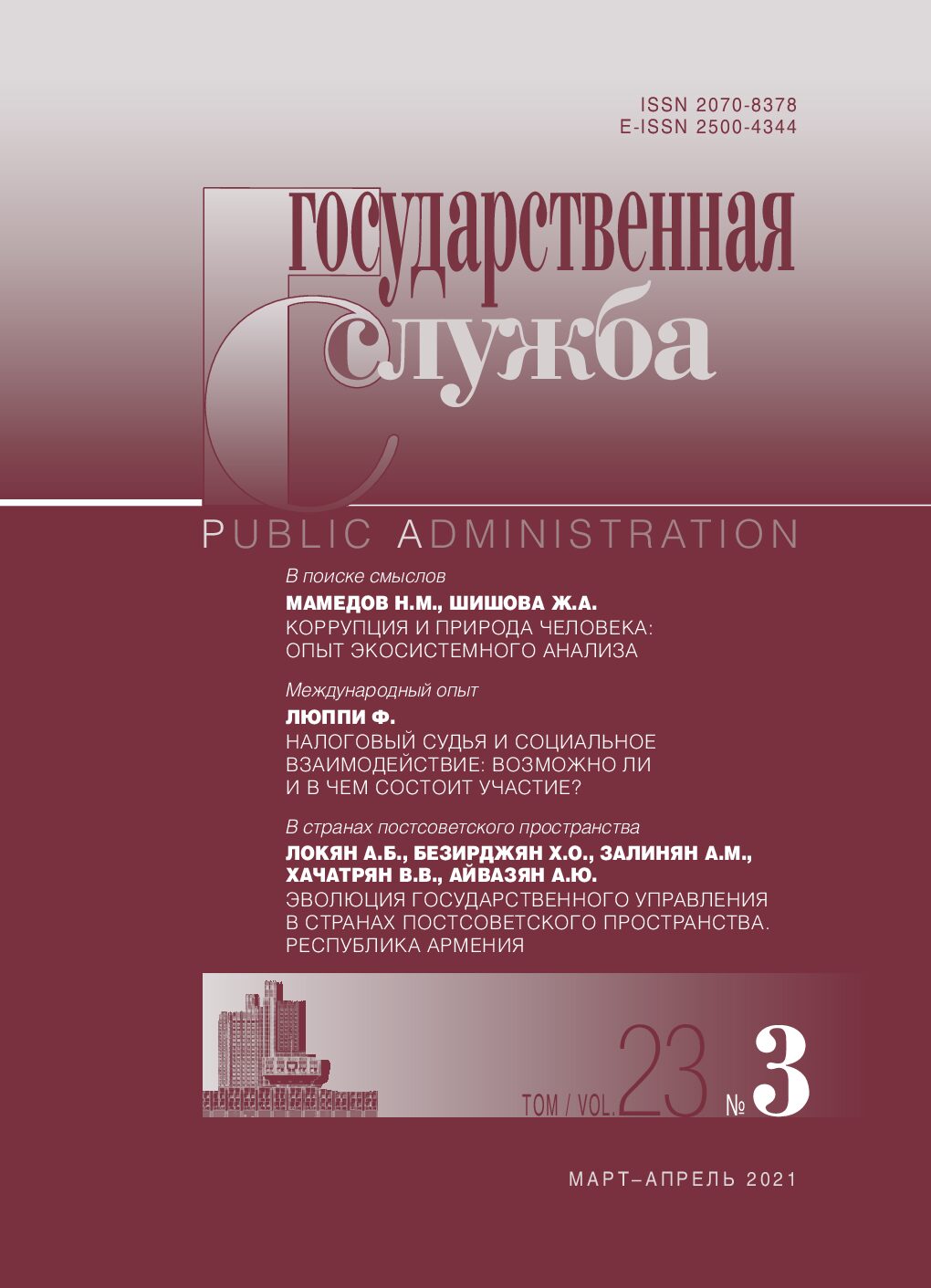Recommended link to article:
NIZAMI MUSTAFA OGLU MAMEDOVа
ZHANNA ALEKSEEVNA SHISHOVAа
аRussian Presidential Academy of National Economy and Public Administration
DOI: 10.22394/2070-8378-2021-23-3-59-64
Abstract:
The global problem of corruption needs an integrative understanding from psychology, sociology, jurisprudence, and cultural approaches. Corruption threatens national and global security, leads to the degradation of humanistic, moral values, and significantly reduces the level of social capital and the effectiveness of governance in a wide range of areas. The article considers the origins of corruption and its motivating factors based on ideas concerning the nature of man, the human psyche, based on an analysis of the relationship between the conscious and unconscious levels of consciousness and subconscious, instinctive impulses. The author discusses the possibility of preventing corruption in an ecosystem approach to civil service, which would allow a holistic presentation of internal and external factors that determine the essence of the civil service, the prerequisites, and conditions for its harmonization with the social environment. By understanding civil servants’ behavior, internal motives, and external incentives, it is possible to define a public service ecosystem that will ensure a symbiosis between the civil service, society, and the State. The creation of such an ecosystem can contribute to the qualitative improvement of public administration.
Keywords:
public administration, state civil service, corruption, human nature, conscious and unconscious levels of the psyche, an ecosystem of public service
Received:
June 24, 2021
References:
Borshchevsky G.A., Makhov E.N. Personality evaluation and competency assessment of heads of the executive authorities of Moscow: sociological study report. Moscow: MGUU Pravitel’stva Moskvy, 2011. In Russian
Vannovskaya O.V. Psychology of corrupt behavior of civil servants: monograph. Saint Petersburg: Knizhnyy dom, 2013. In Russian
Vasilyeva E.A. Professional activities of civil servants: a competency-based approach. Vestnik Sankt-Peterburgskogo universiteta. Sotsiologiya. 2019. Vol. 12. No. 4. P. 329–349. https://doi. org/10.21638/spbu12.2019.403. In Russian
Darwin Ch., Ekman P. The expression of the emotions in man and animals. 4th edition. Moscow; Saint Petersburg [et al.]: Piter, 2013. In Russian
Egorov I. There will be no untouchables: Prosecutor General Igor Krasnov – on new ways to fight corruption. Rossiyskaya gazeta. 2020. No. 8331. December 9. P. 1. In Russian
Zhuravlev A.L., Yurevich A.V. Psychological factors of corruption. Prikladnaya yuridicheskaya psikhologiya. 2012. No. 1. P. 8–21. In Russian
Kitova D.A. Personality representations about social manifestations of corruption. Institut psikhologii Rossiyskoy akademii nauk. Sotsial’naya i ekonomicheskaya psikhologiya. 2019.Vol. 4. No. 1 (13). P. 155–190. In Russian
Lorenz K. Aggression, or the so-called evil. Moscow: AST, 2017. In Russian Lorenz K. The reverse side of the mirror. Moscow: Respublika, 1998. In Russian
Magomedov K.O. Professional condition of personnel of state civil servants, the problems of professional development and personnel processes in the bodies of state power and administration of the Russian Federation: report of the monitoring sociological research. Moscow: RANKhiGS, 2013. In Russian
Mamedov N.M. Historical process and the concept of sustainable development. Vek globalizatsii. 2010. No. 2 (6). P. 33–46. In Russian
Mamedov N.M. Environmental issues and technical sciences (philosophical and methodological aspects). Baku: Elm, 1982. In Russian
Orudzhev Z.M. Human nature and the meaning of history. Moscow: URSS, 2009. In Russian
Ostrovsky A.N. Selected Plays. Moscow: Gosudarstvennoye izdatel’stvo detskoy literatury, 1959. In Russian
Agenda 21: United Nations Conference on Environment and Development in Rio de Janeiro. UN. [B. m. : b. i.], 1992. In Russian
Socio-psychological research on corruption / Ed. by: A.L. Zhuravlev, D.A. Kitova, V.A. Sosnin. Moscow: Institut psikhologii RAN, 2017. In Russian
Jaspers K. The meaning and purpose of history. 2nd edition. Moscow: Respublika, 1994. In Russian
Articles in Open Access mode are published under the Creative Commons Attribution 4.0 International (CC BY) license.

